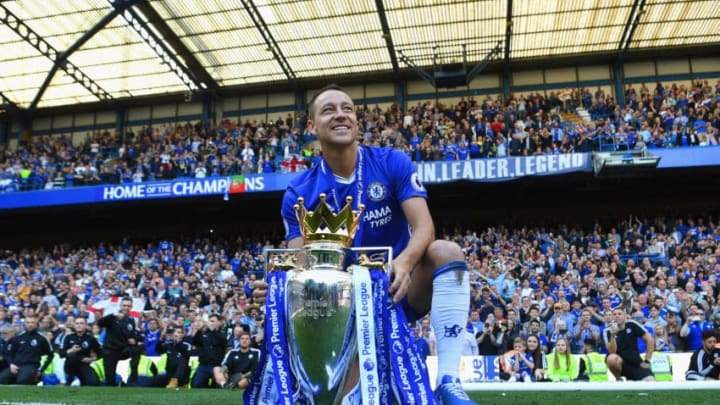Frank Lampard’s youth revolution has helped Chelsea find new icons but the inability to find the new John Terry is denting aspirations.
The old saying tells us that strikers win games and defenders ensure those games are not lost. Jose Mourinho built his Chelsea team in 2004 on the latter principle, assembling a team that frustrated opponents and invariably pinched a goal or two. That team went downas one of the best ever, conceding only 15 goals the entire season, and the club have adopted that defensive identity ever since.
Fifteen years on, Frank Lampard has started a revolution to change the identity his former mentor gave the club. The academy is being successfully integrated with the first team, press conferences and general morale is pleasant as opposed to full of elitist negativity, and a gung-ho attack style has replaced defensive pragmatism.
As Lampard has found out, though, the loss of that defensive pragmatism has come at the cost of Chelsea shipping 13 goals, leaving them 11th in the league without a home win, despite their offensive output.
There are plenty of reasons for the team’s defensive woes: Cesar Azpilicueta’s decline, Emerson’s injury, the glaring gap between the team’s defense and midfield, the lack of understanding between center backs and set piece defending (zonal marking).
The biggest reason, though, is Chelsea not having a general who organizes his teammates, barks out instructions throughout the match and makes any average defenders on the line with him look like world beaters.
Chelsea does not have a defensive leader.
The current crop of center backs at the club iare Antonio Rudiger, Andreas Christensen, Kurt Zouma and Fikayo Tomori. Christensen is an intelligent player and a good distributor but his lack of physicality and mental fragility ends up putting a ceiling on him being just good but not necessarily great. Expectations were high for the return of Zouma, but so far the evidence suggests that the young colossal Zouma of 2015 never truly returned from that unfortunate injury.
Tomori’s emergence has been a delight for every Chelsea fan. He has shown that he is capable of hanging with the big boys in Premier League and pocketing some of them (take a look at Mohamed Salah), and could well go on to become a top defender. But, just like Zouma and Christensen, he lacks the communication skills to be the leader of a defense, however good he might be individually.
That leaves Chelsea fans’ chosen savior of the defense: Rudiger. Everyone seems to believe that his return is magically going to make the club the best defense in the world. That Rudiger is the missing piece of this jigsaw. This belief stems from a common misconception: a leader is the same as a dressing room character.
There are players who love to lighten the mood and keep the morale high off the pitch, such as David Luiz. However, Luiz can never be seen organizing or communicating defensive positioning in matches. Reacting wildly after goals is one thing. Plenty of players do it, including Rudiger and Jorginho. Luiz does it, too. But no one would see Luiz or Rudiger barking out instructions before these goals were conceded. It is this same misconception that persuaded Arsenal to buy Luiz and they are suffering for it.
The greatest example for understanding the concept of a defensive leader would be to study Mister Chelsea himself, John Terry. As a center back, Terry was best placed to observe the entire game. From there on, he would use his defensive acumen and expert positioning to guide his fellow defenders as well as cover for them. He could be heard barking orders constantly during a match. The only time anyone would see him go mute was after the Blues conceded a goal.
Rudiger, like Tomori, is a fantastic defender individually. But fans impressed by his passion and reactions after goals and his dressing room shenanigans must understand that those things do not always convert into leadership qualities. He will not come in and elevate everyone around him like Terry did and should not be expected to.
The closest defensive leader Chelsea has had after Terry was Ethan Ampadu, who quite vividly was pictured instructing then-captain Gary Cahill to get into a better position while defending a set piece. Alas, these days he is rotting on the bench in Germany, much like he did last season under Maurizio Sarri.
Liverpool was excellent last season while defending because of the presence of two defensive leaders: Allison Becker and Virgil Van Dijk. Kepa Arrizabalaga is more David De Gea than Allison, as he will grow into one of the best shot stoppers in the world, but not a presence that brings the defense together as a one unit.
Lampard has found his Lampard-esque goal scoring midfielder in Mason Mount and a Drogba-esque, mentally tough striker in Tammy Abraham. Do not mistake these for lazy comparisons. Both players have similar traits to a young Lampard and Drogba and, more importantly, the mental fortitude they possessed.
It is imperative that he finds his Terry-esque defensive leader to bring solidarity to his Chelsea project. Whether he develops a prospect like Marc Guehi in the same way Claudio Ranieri did with John Terry or relies on the transfer market like Pep Guardiola will be up to him. Perhaps it will define his managerial legacy.
